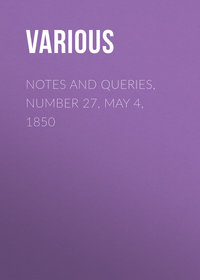Kitabı oku: «Notes and Queries, Number 27, May 4, 1850», sayfa 2
Various
Bir şeyler ters gitti, lütfen daha sonra tekrar deneyin
Türler ve etiketler
Yaş sınırı:
0+Litres'teki yayın tarihi:
16 kasım 2018Hacim:
81 s. 2 illüstrasyonTelif hakkı:
Public Domain